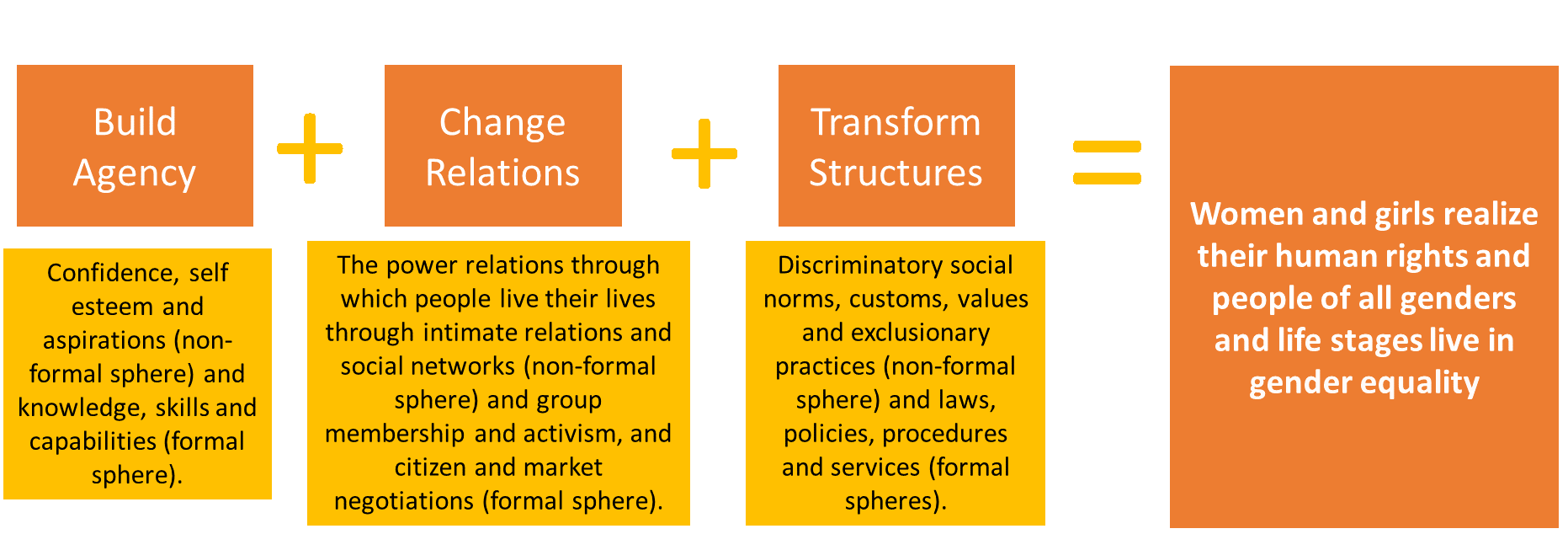May 8, 2018 | by Abigail Bondzie

Photo Credit: © CARE International
“Mata Masu Dubara” (MMD) translates from Hausa to English as “Women on the Move” (WoM). WoM was birthed in 1991 in the Sahel Regions of West Africa, in Niger to be precise. Its birth was inspired by the traditional tontine model widely used in Niger and incited by the critical levels of poverty that affected women in rural Niger. Indicators such as high women’s illiteracy and maternal mortality rates combined with religious and social norms, which conditioned the perceptions of men and women, placed the women of rural Niger in underprivileged positions and clearly demonstrated the disadvantages working against women in rural Niger. With this realization, it was evident that these women needed an intervention which would empower them and help reduce poverty rates, thus the MMD/WoM model was implemented. At SG2018 CARE’s Peer Learning Session, De la Transaction à la Transformation: Les Groupes d’Épargnes, l'Action Collective, et la Participation Politique des Femmes en Afrique de l'Ouest (this session will be translated into English), will discuss the WOM approach and its growth over time.
CARE’s intervention in 1991 begun in the Maradi region of Niger as a pilot for the microfinancing approach. The MMD/WoM approach recognized that women’s empowerment and poverty reduction requires enhancing women’s agency, the transformation of existing structures, and the modification of power dynamics and relations to build an awareness of women’s own human rights and help them work against all forms of gender inequality.

In 2001, the model evolved from the traditional tontine and Savings Groups (SGs) structure to include networks and later, federations. Initially, networks were created to give access to micro projects, but quickly the non-financial collective aspects of women’s empowerment and advancing women’s rights took precedence in the longer-term vision for networks. The networks and federations have been replicated in Mali under the name MJT (Musow Ka Jigya Ton) and efforts are underway to replicate it in Cote d’Ivoire. Today there are 26,445 Groups, 245 Networks and 24 federations in Niger and Mali.
Quite significantly, the MMD model and approach of groups, networks, and federations can be accredited for the social, economic, and developmental transformation of the lives of approximately 3 million women and girls across the West Africa Region.
Latana, 45 years of age and a mother of 7, recounts how she and her family experienced extreme hardship before she joined a savings group in 2005. Both Latana and her husband were jobless and could hardly make ends meet. After Latana lost her son to malnutrition in 2005, she made a bold decision to join a Savings Group (SG) in her community called “husa’a,” meaning “Innovation”. She says, “people around me knew about my story of hardship and some even used my son’s death to mock me, but I knew I wanted to see a change”. Latana signed up for different pieces of training ranging from entrepreneurial skills to leadership, literacy, and education for girls. With her acquired skills, Latana took a loan from her savings group and started a cattle-breeding business, after which she ventured into peanut oil extraction and farming. Latana’s leadership training were so inspiring that she decided to venture into politics and even joined a political party in her community. Today, Latana says, “Thanks to joining Husa’a, I have become a mirror for the women of my community”.
Like Latana, many other women’s agencies have been successfully strengthened through the WoM model. These women have gained knowledge to pursue economic ventures, grow their businesses and capabilities, and learn new skills to support themselves. The recovery of their self-esteem, usually associated with a shift in their aspirations marked by an increasing interest for social, economic and political influence have led to improved power relations. Significantly, the groups and networks in themselves have served as a platform to empower women to change the power relations and dynamics, which affect their decision-making or play out against women’s voice at all levels. In relation to transforming structures, the networks and federations have led to strategic partnerships with Civil Society Organizations, key community members, International Organizations, among others. Through advocacy activities conducted by networks and federations, there have been notable results, especially, in the promotion of girls’ education, combatting child marriage, improved participation in public affairs, women’s access to land, collective income-generating activities, and leveraging investments to alleviate domestic chores.
We invite you to join our session, De la Transaction à la Transformation : Les Groupes d’Épargnes, l'Action Collective, et la Participation Politique des Femmes en Afrique de l'Ouest (this session will be in French and simultaneously interpreted into English) to learn more about the potential of networked Savings Groups to achieve changes in social and political barriers that hold women back. In this session, you will hear about how the Savings Groups networks contribute to the power relationships between men and women. We will also present to you evidence, lessons, and opportunities of how these Savings Groups networks have and can support to shift societal, religious and cultural norms as well influence as policy spaces. The session will present evidence, lessons, challenges, and opportunities of Savings Groups networks that have been supported to work collectively and what could be the future of the model in West Africa.
Abigail Bondzie is the Regional Executive Officer at CARE RMU in West Africa. She is based in Accra, Ghana.
Categories: Global Financial Inclusion Sub-Saharan Africa Women and Girls English Savings Groups Blog Blog Womens Economic Empowerment Blog WebinarsBlogs

1621 North Kent Street, Ste 900,
Arlington, VA, 22209
P 202.534.1400
F 703.276.1433
Website Photos: © mari matsuri
